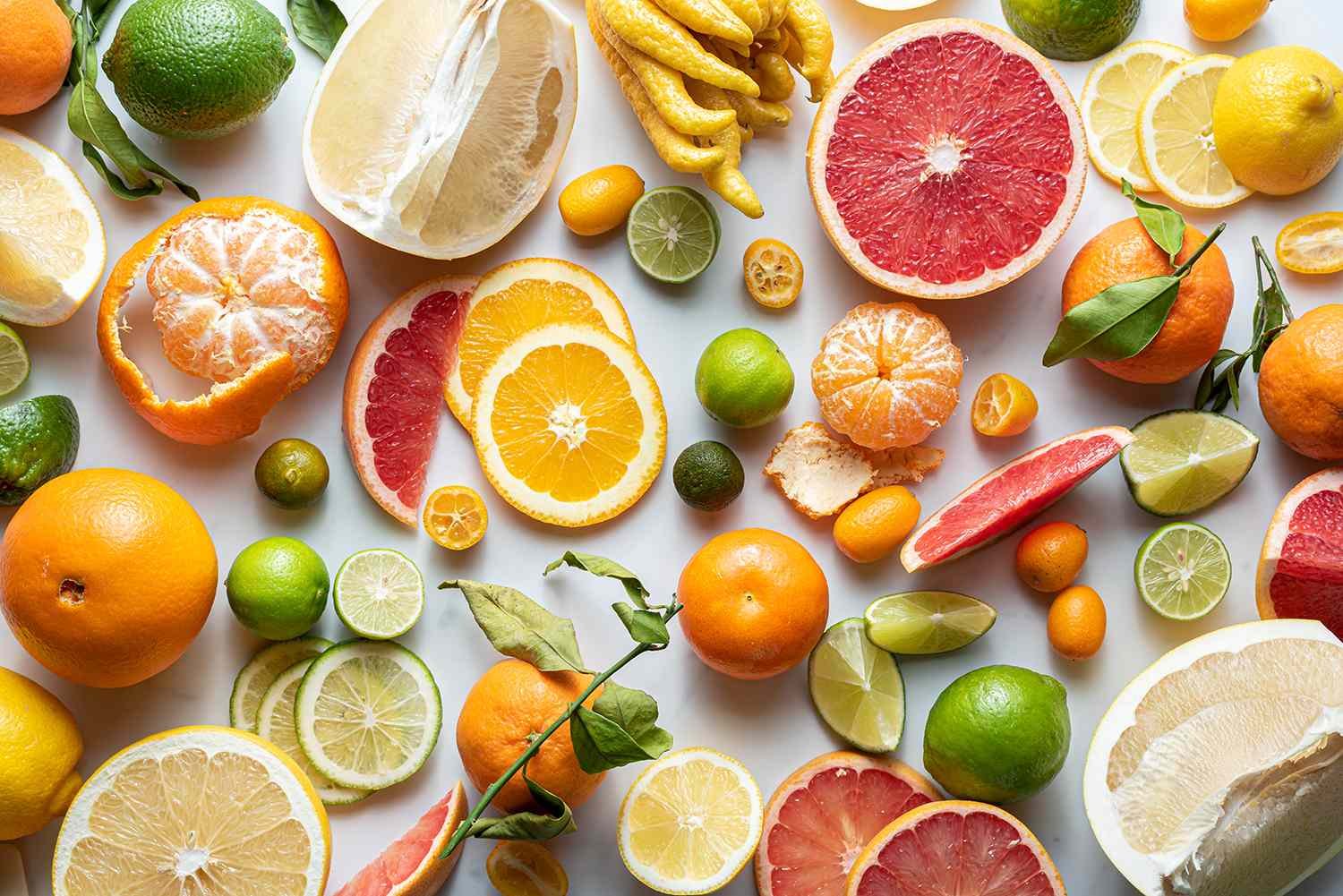Citrus Superstars: Unveiling the Power of Citrus Fruits
Citrus fruits – vibrant, tangy, and bursting with flavor – have long been beloved staples in our diets. Beyond their delightful taste, these fruits have a plethora of health benefits that make them true superfoods. Join me as I peel back the layers to reveal the health benefits, culinary versatility, and the sheer joy that citrus bring to our lives. From the tangy burst of an orange to the zesty aroma of a lemon, it's time to immerse ourselves in the world of citrus. Let’s explore the nutritional wonders of citrus fruits, revealing why they deserve a prime spot on your plate.
Nutrient Profile of Citrus Fruits
Citrus fruits boast a rich nutrient profile, making them not only delicious but also highly nutritious. They are renowned for their exceptional vitamin C content which is crucial for boosting the immune system, supporting collagen production for healthy skin, bones, and blood vessels, and enhancing the absorption of non-heme iron from plant-based foods.
However, vitamin C is not the sole benefit of consuming citrus. These fruits also serve as a valuable source of dietary fiber, promoting digestive health and assisting in weight management by imparting a sense of fullness. Oranges and grapefruits stand out as excellent sources of potassium, vital for upholding proper heart and muscle function while regulating blood pressure. Citrus fruits are also rich in folate which is essential for cell division and DNA synthesis. Moreover, their high water content plays a role in hydration, assisting in the maintenance of fluid balance within the body. Lastly, they are juiced with antioxidant compounds known as phytochemicals.
Antioxidant richness
Phytochemicals are molecules that naturally occur in plants, often responsible for plant’s color, flavor, and protective properties. Flavonoids take center stage in citrus fruits as they play a crucial role in reducing oxidative stress within the body. What is oxidative stress? It occurs when there’s an imbalance between the production of free radicals (reactive, unstable molecules) and the body’s ability to neutralize them, it’s linked to various chronic diseases and the aging process.
The anti-inflammatory effects of citrus flavonoids add another layer to their health benefits. Inflammation is a natural response to injury or infection, but chronic inflammation is associated with conditions like cardiovascular disease and certain cancers. Citrus flavonoids contribute to mitigating inflammation, potentially lowering the risk of these inflammatory-related ailments.
Incorporating Citrus into Your Diet
There is no one-size-fits-all recommendation for daily citrus fruit intake, as individual dietary needs vary based on age, sex, health status, and overall calorie requirements. However, general guidelines can provide a helpful starting point. The Dietary Guidelines for Americans suggest a daily intake of about 2 cups of fruit for adults on a 2,000-calorie diet. While this recommendation doesn’t specifically target citrus fruits, including a VARIETY of fruits in your diet, including citrus, is encouraged for overall health.
Tips on incorporating citrus into your diet would be to snack on them between meals or incorporate them into meals. The unique flavor that citrus adds to a meal can elevate your culinary creations. They are incredibly versatile as they can be incorporated in both sweet and savory dishes.
Below I have shared two recipes that incorporate citrus: a smoothie and a salad.
Interesting fact that I learned while writing this:
Studies have shown that citrus peels have greater amounts of antioxidant activity than pulp and seeds. Now, this doesn’t mean that you should just straight up eat the peel, that would be a bit bitter. But adding zest to a recipe or even adding a strip to a smoothie could be a beneficial way to boost your antioxidant activity.
Recipes:
1. If you find it hard to incorporate citrus, greens, and/or protein in your diet, this smoothie is for you!
1 ½ cups unsweetened vanilla almond milk
2 TBS plant-based vanilla protein powder
½ large grapefruit peeled
1 medium orange peeled
1 banana frozen
1 cup strawberries frozen
2 cups spinach frozen
1 TBS honey optional
2. In honor of citrus, fennel, and avocados being in season, here is a salad recipe incorporating the three.
1 fennel bulb, sliced into wedges and roasted
1 fennel bulb, very thinly sliced
5 radicchio leaves, torn
2 satsumas or 1 small orange, segmented
1 small pink grapefruit, segmented
1 avocado, sliced
2 tablespoons pine nuts
¼ cup shaved pecorino
¼ cup fresh mint leaves
Sea salt and freshly ground black pepper
Citations:
Hussain T, Kalhoro DH, Yin Y. Identification of nutritional composition and antioxidant activities of fruit peels as a potential source of nutraceuticals. Front Nutr. 2023 Feb 2;9:1065698. doi: 10.3389/fnut.2022.1065698. PMID: 36817065; PMCID: PMC9931757.
Kelly 06.08.2023, et al. “Citrus Salad with Fennel & Avocado.” Love and Lemons, 12 Nov. 2022, www.loveandlemons.com/citrus-salad/#wprm-recipe-container-45867.
Laura. “Green Citrus Smoothie (with Grapefruit).” JoyFoodSunshine, 20 Oct. 2021, joyfoodsunshine.com/citrus-protein-green-smoothie/.
Lv X, Zhao S, Ning Z, Zeng H, Shu Y, Tao O, Xiao C, Lu C, Liu Y. Citrus fruits as a treasure trove of active natural metabolites that potentially provide benefits for human health. Chem Cent J. 2015 Dec 24;9:68. doi: 10.1186/s13065-015-0145-9. PMID: 26705419; PMCID: PMC4690266.
